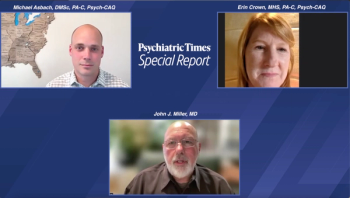
TAAR1 and the Future of MDD Treatment
New research explores ulotaront as an adjunctive therapy for adults with major depressive disorder.
In December, the first patient was enrolled in the first trial studying the use of a trace amine-associated receptor 1 (TAAR1) agonist to treat major depressive disorder (MDD) in adults. This Phase 2/3 clinical study will aim to evaluate the TAAR1 agonist ulotaront (formerly known as SEP-363856) as an adjunctive therapy for adults with MDD.
In this Mental Health Minute, John Kraus, MD, PhD, shares his insights and thoughts on what the activation of the TAAR1 receptor could mean for the future treatment of MDD. Kraus is executive vice president and chief medical officer at Otsuka Pharmaceutical Development & Commercialization, Inc. Otsuka and Sunovion Pharmaceuticals are jointly developing and studying the agent.
The current study is a global, multicenter, randomized, double-blind, and placebo-controlled study that was designed to determine the efficacy, safety, and tolerability of ulotaront as an adjunctive therapy for adults with MDD. As part of the study, patients who have had an inadequate response to current antidepressant treatment will be randomized to receive either the study medication or placebo in addition to their current antidepressant regimen.
TAAR1 has garnered much attention and excitement as a potential treatment target in psychiatry. The US Food and Drug Administration (FDA) granted breakthrough therapy designation to ulotaront for the treatment of schizophrenia in 2019.
For those interested in learning more, including opportunities to enroll patients in the study, the
Dr Kraus is executive vice president and chief medical officer at Otsuka Pharmaceutical Development & Commercialization, Inc.
Newsletter
Receive trusted psychiatric news, expert analysis, and clinical insights — subscribe today to support your practice and your patients.







